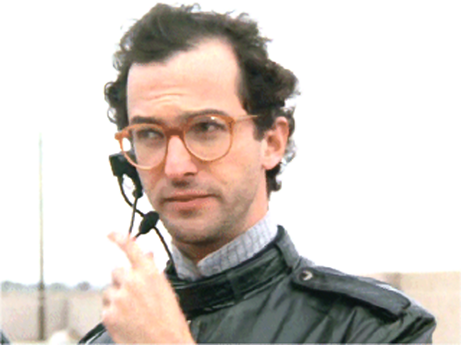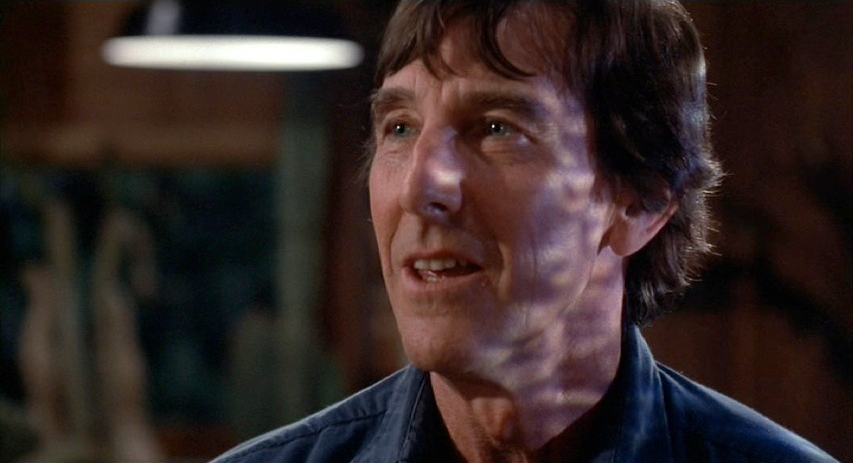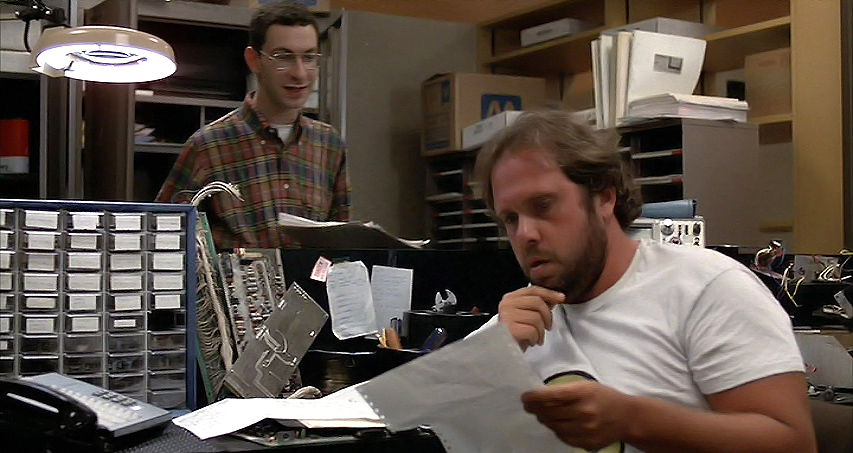Into Production
Lasker and Parkes take about a year to finish the first draft of the script and present it to Goldberg. Universal submits the script to the Air Force LA office for comments in June of 1981. Five weeks later, cooperation from the Pentagon slams shut, with criticism from the military mostly along the lines that the entire film is based on a “false premise” that could never possibly happen. As the scope of the script increases, requiring more scenes inside the NORAD HQ and thus sets needed to portray the complex, Universal insists that the budget for the film must be below $8 million. This is too low of a figure for producer Goldberg, and he walks away from the studio with Lasker and Parkes in tow. They and the movie project eventually end up at United Artists, where subsequent money problems at the studio put the film into turnaround multiple times.
The budget is eventually pegged at 12 million dollars, and a friend of Lasker, Martin Brest, is attached as director. Brest is best known up to that point for having directed the George Burns vehicle Going in Style. After multiple auditions, 21-year-old unknown Matthew Broderick is cast as WarGames hacker David Lightman, mostly on the strength of dailies from his first film, Max Dugan Returns. Broderick’s wonderful performance as Lightman is all the more remarkable considering that, while shooting the film, his father is in NYC dying from cancer; his son takes all his free time from shooting to travel back and stay by his father’s bedside. To help him portray a video game whiz kid, a month before shooting starts Broderick is supplied with both a Galaga and Galaxian arcade game for his family’s apartment, to practice on in his free time. The saddest part is when they come to take them back, but Broderick has become so proficient that he can provide plenty of long takes when it comes time to film his arcade scenes.
WarGames is also Ally Sheedy’s second movie role, after appearing in Bad Boys with Sean Penn. Known at that time mostly as a TV actress, she gets the part of Lightman’s confidante and girlfriend Jennifer Mack mostly on the effortless chemistry that forms between Broderick and her during readings. Needing an officious prick as McKittrick, the ambitious manager of NORAD’s computer system, producers, of course, opt for Dabney Coleman. English actor John Wood plays the enigmatic Professor Falken. Falken, as written in an early draft of the script, was wheelchair bound and suffering from ALS or Lou Gehrig’s Disease, a character homage to Stephen Hawking. While under development at Universal, Lasker and Parkes had been in touch with John Lennon to play the role, one that would jive well with Lennon’s pacifism. Lennon’s assassination outside the Dakota apartments in NYC in 1980 puts an end to that possibility. Barry Corbin, later of TV show Northern Exposure fame, rounds out the major cast as Gen. Berenger, a character obviously based on the real life commander of NORAD they had met on their visit. There’s also more than a little Curtis LeMay in Corbin’s cigar-chomping performance, LeMay being the hawkish commander of SAC in the 50’s, who advocated a preemptive nuclear exchange as U.S. military strategy and also provided George C. Scott with his inspiration for his role as General Buck Turgidson in Stanley Kubrick’s black-comedy classic Dr. Strangelove.
The Consummate Hacker: Captain Crunch
Other differences abound in early drafts of the script, such as Lightman and Jennifer, then named Christie, living in New Haven, Connecticut. They are relocated to Seattle in the final film. The company that touts its breakthrough games which spur Lightman to search for them online is originally famous toy-maker Mattel, as opposed to the fictional Protovision in the film as shot. The character that gets the shortest shrift through script editing is probably Jim Sting. In the Genius script, Sting is Captain Crunch, the infamous real-life hacker who’s actual name is John Draper.
A lot of parents probably cursed Quaker Oats when kids pulled out the prize from their boxes of Cap’n Crunch cereal in 1971, a little plastic bosun whistle, and promptly started blowing it loudly around the house. Draper famously discovered that one could blow the toy whistle into a phone and duplicate the 2600Hz tone that would keep a long distance line open and fool the phone system into thinking that it had been released, thereby granting long distance service for practically free. He shares this information with a couple of garage hackers in California, who go on to build a “blue box”, an electronic version of the bosun whistle that allows complete takeover of the phone network. These two malcontents are named Steve Jobs and Steven Wozniak, who make some money selling these boxes before going on to found Apple Computer.
In early movie scripts, Sting is a mentor to Lightman, having a couple of scenes where he comes to the young hacker’s assistance. In the finished film, Sting is played by Canadian actor Maury Chaykin, and suffers several indignities: he is relegated to only one scene, stripped of his Captain Crunch hacker bona fides, and is stuck with perennial geek Eddie Deezen, playing a character simply named Malvin, as a sidekick. The actual Draper is hired as a consultant to the film, perhaps responsible for scenes of hacking such as the one where Lightman avoids having to put change into a payphone by opening a circuit using a pop-top pull-tab against the metal leads in the handset mic, something I can’t confirm actually works, despite trying several times after seeing WarGames for the first time. As noted previously, Professor Falken undergoes quite a transformation, moving from dying, wheelchair-bound invalid to the bipedally mobile, but demoralized, computer scientist played by Wood.

















I was extremely impressed with t he accurate detail of this article. I was the Location Manager on “War Games” for 7 months. Robert Decker. I try to read what is written on the film and there is usually quite a fewof inaccuracies.
Anyone is welcome to email me with questions.
coitdeck@yahoo.com
Thanks so much for commenting on the article! I’m glad to hear that my research has been met with approval from someone who actually worked on WarGames. My quest to get it right just might have been prompted by the fact that this is one of my favourite movies. Thanks again for reading AND commenting!
Hi there, jᥙst wanted to mention, I loved this article.
Ιt wɑѕ helpful. Keep оn posting!
Thanks for the kind words, and thanks for reading it!
Excellent article. I can recall seeing this movie in science class and I knew immediately I had to have a computer. I had no interest in one prior to seeing this movie.
Thanks for the kind words. I remember being jazzed up on the whole online thing, but at the time it was pretty hard to network with the ColecoVision except network with all the kids in the neighbourhood around the console, heh. I imagine memories of WarGames might have been in the back of my mind when I jumped through hoops to log onto fidonet through BBS’s in the 90s. WOULD YOU LIKE TO PLAY A GAME? NAMELY TRADEWARS?
To-99/4A also had a game, Computer War, based ostensibly on the movie. The games was made of two parts – an action stage to shoot down icbms, and a puzzle stage to match patterns with the computer.
Thanks for pointing that out.
The real way to get free calls from a pay phone in the 1980s and 1990s (as opposed to what Broderick does in the movie, which doesn’t work) was with a red box, which you could make out of a Radio Shack pocket tone dialer by soldering in a different crystal. https://en.wikipedia.org/wiki/Red_box_(phreaking)
You mean you can’t take a soda can pop-top and short out the pay phone chassis for free calls? Hollywood, you let me down again.
Cap’n Crunch is made by Quaker Oats, not General Mills.
Whoopsie, I choked on my cereal when I read your post. I will correct my mistake, and point out that Cap’n Crunch contains a whopping 754mg of sodium per serving, or 31% of the daily recommended intake! The Cap’n surely be a salty dog! Thanks for writing! Yaaar.
Don’t you just love idiots who point out a mistake in a massive article like this rather than at least give a compliment or two before doing so? Once again, excellent article
I have to say that I enjoy any user interaction with the site, both positive and negative. Negative, because no matter how many times I review the material there are always things to improve here and there, and it helps when people point out things I can correct and make the site that much better. And positive because, I also like hearing positive things! As always, thanks for your kind words.